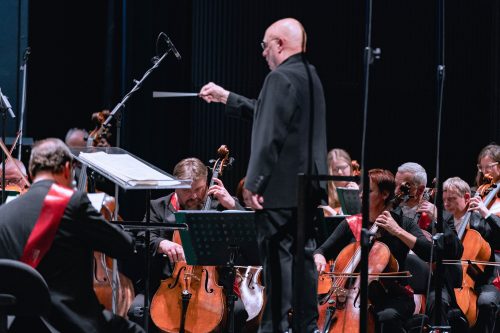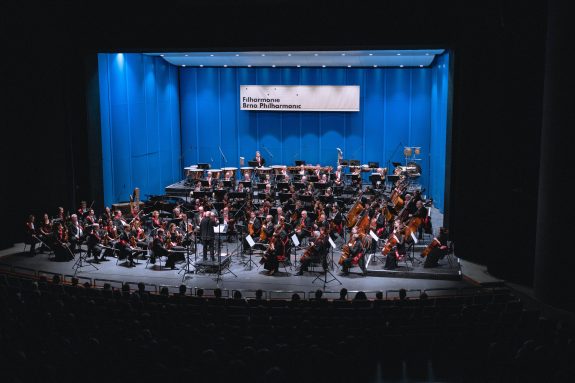 Czech Republic Skrowaczewski, Bruckner: Brno Philharmonic Orchestra / Dennis Russell Davies (conductor). Janáček Theatre, Brno, 24.11.2023. (GT)
Czech Republic Skrowaczewski, Bruckner: Brno Philharmonic Orchestra / Dennis Russell Davies (conductor). Janáček Theatre, Brno, 24.11.2023. (GT)

Stanisław Skrowaczewski – Passacaglia immaginaria
Bruckner – Symphony No.6 in A major, WAB 106
The musical creativity of the Polish conductor and composer Skrowaczewski (1923-2017) is little known despite his long association with ensembles both in the United States and Europe. Passacaglia immaginaria was inspired by the Baroque passacaglia form and commissioned by the Minnesota Orchestra in 1995, which gave the premiere under the conductor’s baton, and was nominated for a Pulitzer Prize. Denis Russell Davies was a longstanding friend of the composer, and this performance marks the birth centenary of Skrowaczewski in October 2023.
According to his publisher Schott: ‘No two Skrowaczewski scorings are exactly the same. He creates a unique tonal canvas for each piece, proceeding from a palette devised for the substance of the piece, always plumbing the deepest pools of sound and exploiting exotic percussion. The result is highly coloured, evocative music rendered in a free harmonic language that heightens the emotional content of each work.’
‘Skilful, imaginative, and full of passion, the works of Stanislaw Skrowaczewski challenge a musician’s technique while expanding the listeners’ awareness of the power of music to describe the indescribable. For the composer, all art is a dialogue with the unknown. “This dialogue,” says the composer, “encompasses all the fundamental human concerns such as the meaning of life and death, love and cruelty, and sacrifice and redemption in the constant hope to know that which cannot be known. Art thrives on metaphysical ideas … and is a powerful antidote for the spiritual ills of our chaotic, violent and troubled times.”’
I had never heard this Polish/American composer’s music, so this evening provided entry into his soundworld. The Passacaglia immaginaria opened on the percussion, strings and celeste, which created a strangely unique atmosphere and embraced a range of emotions, yet little meaningful impression. There were hints of Shostakovich’s symphonies, especially in the final moving bars with the mass strings slowly bringing to a memorable conclusion, heard against the celeste finally creating a moving impression – but there was little originality in the thirty-minute work.
Of course, Skrowaczewski’s most celebrated recordings were his complete Bruckner cycle as a conductor. I confess that I have not heard any of his recordings, yet his work was well received, and he won a prize for his Bruckner Ninth recording. The Bruckner Sixth was a welcome inclusion in the programme particularly as Dennis Russell Davies is a renowned interpreter of the composer; during his tenure at the Bruckner Orchestra Linz, he performed and recorded all of the Bruckner symphonies. Since he assumed the chief conductorship of the Brno Philharmonic Orchestra in 2018, he has conducted performances of the First, Fourth and Fifth symphonies – anticipating the composer’s birth centenary in 2024.
In his lifetime, Bruckner only heard the middle two movements of the Sixth when it was performed by the Vienna Philharmonic Orchestra. Mahler gave the premiere, albeit with cuts, in 1899 in Vienna. It was only in 1935 that the original version was performed under the baton of Paul van Kempen. The Sixth has always been thought less popular, for as Austrian musicologist Max Auer suggested, it misses the ‘heroic fire of most of its sisters.’
The opening movement (Maestoso) was impressively intense as there emerged the feeling as if one was observing the sun rising on a misty morning in the mountains, and as the lower strings entered there was generated a passage of imposing grandeur. There was excellent virtuosity from the strings led by Pavel Wallinger, and especially from the glorious brass, and the strings played with abandon from one section to another. Nevertheless, the inevitable Brucknerian rhythm emerged amid glorious playing from the horns, especially from Karel Hofmann. Bruckner’s theme of yearning was demonstrated beautifully by the strings, with the lively horns and the trumpets proclaiming the fanfare.
The Adagio proved the emotional core of this performance, and it was achieved by Davies with great power and intensity – the intonation of the oboe solo by Anikó Kovarikné Hegedűs in anticipating the horn theme was of celestial beauty. The mastery of Davies’s conducting was palpable in commanding the strings before the C minor melody on the violins ushered in a funereal march-like passage. The orchestra was in top form here, especially in the dreamlike moments in the Scherzo, and enhanced by the mysterious and charming trio. It was noticeable how Davies masterfully controlled the silences between sections, allowing the strength of the ideas and themes to be realised with great precision – this was most perceptible in the Finale executed with terrific virtuosity and confidence. The brass chorale with the three intertwined themes created song-like elan before the idea from the opening movement returned forcefully.
This was a magnificent performance of a symphony that is not always appreciated, yet here in Dennis Russell Davies’s conducting it was revealed as among the composer’s masterworks. Certainly, this concert shows how this fine orchestra embraces a repertoire of neglected twentieth-century works and the gems of the nineteenth century and displays great virtuosity in all the orchestral sections led by an outstanding conductor.
Gregor Tassie
